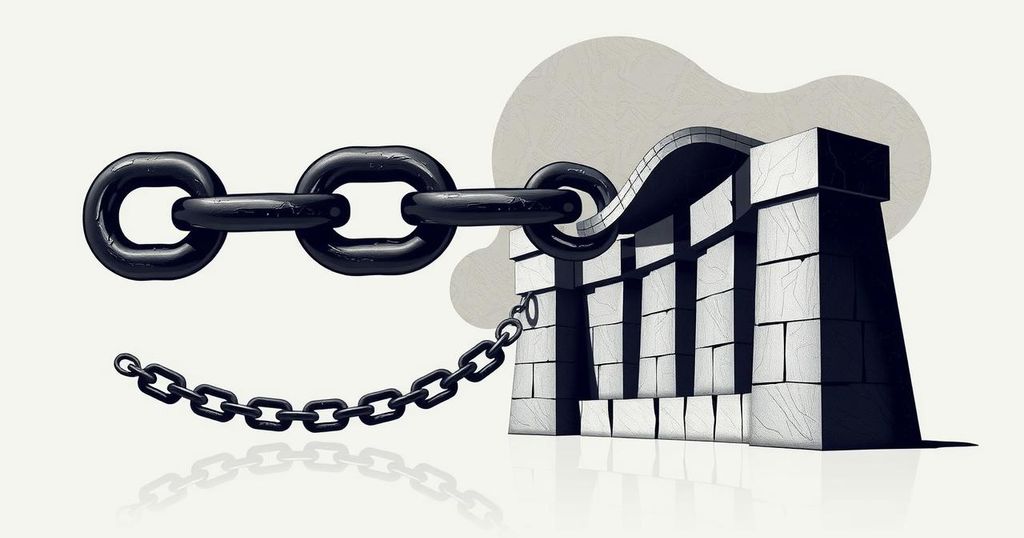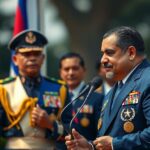Trump Administration Considers Sending Venezuelan Gang Members to El Salvador
The Trump administration is negotiating with El Salvador to send non-Salvadoran migrants, including Venezuelan gang members, to Salvadoran prisons. This initiative follows President Bukele’s strict anti-gang measures, leading to concerns over human rights amidst reduced violence. The discussions are linked to Secretary of State Marco Rubio’s trip, focusing on migration challenges from Latin America.
The Trump administration is currently engaged in discussions with the government of El Salvador to potentially revive an agreement that would permit the United States to send non-Salvadoran migrants, including members of the Venezuelan gang Tren de Aragua, to Salvadoran prisons. Mauricio Claver-Carone, the State Department’s special envoy for Latin America, indicated that this proposal follows El Salvador’s significant crackdown on gangs under President Nayib Bukele’s regime, which has led to the arrest of over 84,000 individuals without sentencing.
El Salvador’s approach to crime control has faced scrutiny for human rights violations, yet it has resulted in a notable reduction in violence associated with notorious gangs such as Mara Salvatrucha (MS-13) and Barrio 18. Bukele has garnered support from several right-wing figures in the United States despite concerns over democratic principles. Notably, the Tren de Aragua gang has become a focal point in Trump’s rhetoric, prompting discussions about their potential repatriation to Venezuela.
Claver-Carone expressed confidence that gang members would prefer returning to Venezuela rather than facing incarceration in El Salvador, a strategy that aligns with the broader migration agenda during Secretary of State Marco Rubio’s upcoming visit to Latin America. This trip will prioritize discussions on migration and may urge regional allies like Bukele to enhance collaboration in managing migrant populations, particularly from countries resistant to accepting deportations.
The revival of this agreement would resemble the “Safe Third Countries” policy implemented during Trump’s first term, which mandated asylum seekers to apply for protection in deemed “safe” nations before reaching the U.S. border. While Trump’s approach sought to limit access to asylum, significant concerns remain regarding the safety of migrants in the Central American region, noted for its gang violence.
Claver-Carone described Bukele as “the most consequential president in the region” and emphasized the need for continued partnership on migration issues. Despite a decline in Salvadoran migration to the U.S., Bukele has introduced measures to restrict transit through the country, responding to pressures from the Biden administration that shifted its stance on Bukele amid warnings regarding democratic decline.
The discussions between the Trump administration and El Salvador are rooted in ongoing migration challenges in Latin America, particularly the influx of migrants from Venezuela, Nicaragua, and Cuba. El Salvador’s aggressive tactics against gang violence under President Bukele have drastically altered the socio-political landscape of the country. The U.S. aims to leverage Bukele’s hardline policies to facilitate the return of migrants deemed noncompliant with current immigration laws and asylum requirements, reflecting a continued trend of prioritizing national security over humanitarian approaches.
In conclusion, the Trump administration’s discussions to revive an agreement allowing the transfer of Venezuelan gang members to Salvadoran prisons highlight a strategic maneuver in handling migration and gang violence. While Bukele’s heavy-handed tactics may be effective in reducing crime rates, they raise significant human rights concerns. The growing alliance between the U.S. and El Salvador reflects a complex interplay of regional politics and migration management amid evolving challenges in the Americas.
Original Source: abcnews.go.com








Post Comment